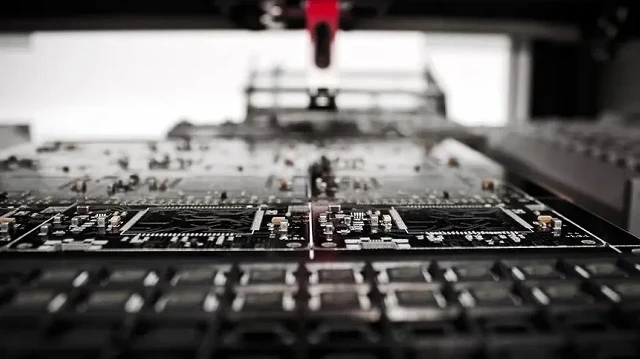
Chip designer Yongatek Microelectronics, Turkish appliance maker Beko develop microcontroller for home appliances to be mass produced in 2026
Türkiye is gearing up to begin mass production of homegrown chips aiming to reduce its dependency on foreign technology.
Ali Baran, CEO of Turkish chip design firm Yongatek Microelectronics, told Anadolu that the company has been working since 2014 to become a national hub for chip design and production.
Baran shared that Yongatek is currently collaborating with Turkish appliance maker Beko to develop microcontrollers for use in home appliances as part of Türkiye’s HIT-30 funding program.
Baran said the research and development for the microcontroller project has mainly been completed and the prototypes will go into production at the end of the year, with mass production beginning next year.
“Beko alone will have an annual usage of these MCUs of 30 million and in the sectors of defense, robotics, and IoT, the number can reach up to 50 million,” he said.
With heightened struggles amid the tech and chip trade war between the US and China, the two countries’ dominance in the field spell a threat to the rest of the world’s efforts to produce their own chips, Baran said.
“Chip manufacturing used to be designed in Silicon Valley but made in Asia-Pacific, and that chipmaking was a less critical and labor-intensive process, but in the last few decades, the chip business has become quite significant, as we saw a chip crisis during the pandemic,” he said.
Baran noted that major US firms such as Nvidia, Qualcomm, Broadcom, and Apple are moving chip production to the US, which he said could create a new frontier in the “chip war” if fully achieved.
Baran stated that chips will “replace oil as the defining resource of this century, and that artificial intelligence (AI) will be the arena.”
“The firms that can break the game are in China and the Middle East. The first countries to produce advanced AI chips will get ahead (of) others and this will be a significant competition for the next 50 years if not 100,” he said.
To accelerate chip production domestically, Baran said Türkiye plans to offer a support package worth around $5 billion to attract international tech companies to establish production infrastructure in the country.
Currently, Türkiye relies almost entirely on imported chips, though some domestic companies produce limited sensors.
“Sure, we’ll build a chip plant — there are hundreds of them around the world — but it will not be enough to meet the chip needs of an entire country, but we want an investment to produce some of the chips to be widely used in Türkiye,” he said.
While high-tech 7- and 5-nanometer chips are being discussed for chip development, the first goal of chip production in Türkiye will start with home appliances. “We may even see 28, or 40, nanometers — the 40-nanometer chips we currently produce meet the needs but we could also see slightly newer chips up to 22 nanometers, which would be used for the auto sector,” he said.
Baran stated that it can take up to three years to establish a chip production line, calling on firms like Aselsan and the country’s Scientific and Technological Research Institution (Tubitak) to contribute to the efforts.
Baran noted that the Communication Technologies Cluster (HTK), where he serves as a board member, is working towards meeting the country’s sector needs, which Chinese firms currently dominate. “We don’t want this to continue, as we want this know-how to be in our country in the long term, though we are open to collaborations with foreign firms,” he said.
Baran mentioned that the defense industry’s latest hurdle is also chips, as field programmable gate arrays (FPGA) integrated circuits are heavily used in defense. “A possible restriction on FPGAs would deeply affect Türkiye’s defense industry, so we’re evaluating how to ensure supply security as Yongatek — we continue to work with a number of foreign firms to create one of our own,” he said.
“We are also working with Beko for microcontroller units (MCUs) as they are also fundamental in the defense industry — MCUs are in everything ‘smart’ nowadays; they are in home appliances, in Internet of Things (IoT) devices, and in defense,” he noted. “We want to produce both FPGAs and MCUs to meet the needs of the defense industry and reach a point where we no longer need anyone else in the field.”
Baran stated that Yongatek is also working on developing AI chips to power smart cameras and smart city applications for security purposes. “It is a large project with domestic and international customers for the 12-nanometer TSMC (Taiwan Semiconductor Company) chip,” he said.
The AI camera chip will enter mass production in 2027 and 2028, while the FPGA is still being developed via a European consortium. “We aim to have an infrastructure in Türkiye to produce mid-level 1-2 FPGAs previously used by American chip firm Xilinx — this will be completed as a proof of concept, and then we (will) make plans for mass production later down the line,” he noted.
He also shared that Yongatek is working on a chip to be used for 5G non-terrestrial network (NTN) in the near future.
To end Turkiye’s foreign dependency, Baran stated that more “design houses” for chips need to be established in Türkiye and he urged Turkish engineers working abroad to return and contribute to national efforts.







